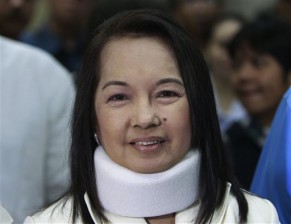Arroyo, son file medical parole bill
Ailing former President Gloria Macapagal-Arroyo, who is once again in detention this time for plunder, is seeking a medical parole for prisoners suffering from an incapacitating physical condition, like herself.
Arroyo, now a Pampanga representative, has coauthored House Bill No. 6608, which lays the guidelines that would allow the Board of Pardons and Parole to grant liberty to inmates who are considered very ill.
The measure is in response to the “overwhelming number” of inmates who die in prison due to medical complications, according to the explanatory note to the bill, which Arroyo coauthored with her son, Camarines Sur Rep. Diosdado “Dato” Arroyo.
“For humanitarian considerations, the grant of a medical parole should be allowed since all persons must be treated with dignity, whether in or out of prison, and irrespective of the crime committed,” the note stated.
Under the proposed law, the Board of Pardons and Parole would be authorized to grant medical parole to prisoners who have been found to suffer from an incapacitating physical disease, condition or syndrome, as diagnosed by a licensed government physician.
Article continues after this advertisementThis would not apply to inmates sentenced to death or life imprisonment.
Article continues after this advertisementThe diagnosis must include a description of the inmate’s condition, as well as the prognosis addressing the likelihood of the prisoner’s recovery from the physical condition, disease or syndrome, and the extent of any potential recovery.
A prisoner would only be eligible for medical parole if he or she is unlikely to be a threat to public safety and is unlikely to commit an offense when granted a conditional release. The board should also prepare a medical parole plan that ensures the inmate’s appropriate supervision and placement.
The Board of Pardons and Parole, the Bureau of Corrections, the prisoner or the prisoner’s parents, grandparents, children or siblings may request the medical parole in writing to the director of the Bureau of Corrections.
The bill also states that the parole board may require periodic checkups and diagnoses for prisoners as a condition of their medical parole, the expenses for which they must shoulder as well.
If a prisoner’s physical condition has improved to the extent that he or she may pose a danger to the public—as determined by the parole board or the Bureau of Corrections—the latter may revoke the medical parole and return the inmate to custody.
The bill says the board is barred from granting a medical parole sooner than one year before the prisoner’s earned release credit date unless, based on medical information, the prisoner’s condition is so serious that he or she is not expected to live longer than a year.
The bill was filed on Sept. 26 and was referred to the committee on justice earlier this month.
Arroyo, who has neck, spine and heart ailments, has been returned to the Veterans Memorial Medical Center (VMMC) where she has been detained after the Sandiganbayan ordered her arrest earlier this month for plunder stemming from the alleged misuse of Philippine Charity Sweepstakes Office funds.
Arroyo earlier left the VMMC on bail in July after she was charged with electoral sabotage.
Originally posted: 8:22 pm | Monday, October 22nd, 2012
